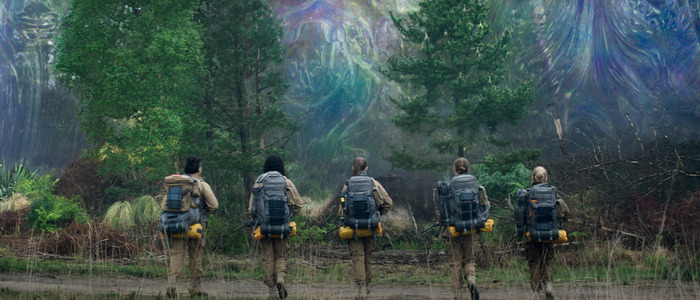'Annihilation' Spoiler Review: A Strange, Haunting Masterpiece
(In our Spoiler Reviews, we take a deep dive into a new release and get to the heart of what makes it tick...and every story point is up for discussion. In this entry: Alex Garland's haunting Annihilation.)
With Annihilation, Ex Machina director Alex Garland has crafted a weird, challenging, and disturbing sci-fi horror film that will repel some and amaze others. This is the type of strange, hypnotic work that film fans obsess over. Don't be surprised if people are studying and talking about this film in years to come.
This Annihilation spoiler review will attempt to get to the heart of Garland's often impenetrable film. Spoilers follow, obviously.
On the morning when I woke up without you for the first timeI felt free, and I felt lonely, and I felt scaredAnd I began to talk to myself almost immediatelyNot being used to being the only person there– The Mountain Goats, "Woke Up New"
It’s a Terrible Thought
There are many scenes in Annihilation that I can't get out of my head, but one in particular stands out most of all.More than halfway through the film, the all-female expedition into the strange, eerie Area X (a former national park blanketed in an unearthly phenomena known as the Shimmer) has been decimated. Two of the five team members are dead, one has abandoned the group, and now only two remain. They are Lena, a biologist played by Natalie Portman, and Josie, a physicist (Tessa Thompson).The previous night, the team had been attacked in a nightmarish sequence that gives almost every horror movie in recent memory a run for its money. A mutated bear, the flesh from its head peeled away to reveal a skull, was the attacker, and it made mincemeat of one of the team members, Anya (Gina Rodriguez). The bear had already killed another team member, Sheppard (Tuva Novotny), and, perhaps worst of all, when it attacked the rest of the team it emitted Sheppard's pained death wails. Rather than a roar or a growl, it was Sheppard's shrieking voice that sounds from the mouth of this beast.Now, in the light of the following day, with the creature slain and the team's leader, Dr. Ventress (Jennifer Jason Leigh) gone off on her own, Lena and Josie sit side by side in the sunlight. The field that circles their location is peppered with strange flowering plants – flower-covered trees that are shaped exactly like human beings, frozen in mid-stride."It was strange, hearing Sheppard's voice last night," Josie says, almost dreamily. "I suspect that as she was dying, part of her mind became part of the creature that was killing her...It's a terrible thought. To die frightened and in pain, and have that as the only part of you which survives. Trapped in the mind of an animal."It's a terrible thought.The way Thompson delivers this mini-speech, her voice hazy, sounding as if she's winding down, makes the moment unnerving. Things only get more unsettling from here. Josie, we've learned, is covered in self-inflicted scars from a history of cutting herself. For most of the film, the scars on Josie's arms are hidden. Now, following the night of the bear attack, the scars are exposed for all to see.The Shimmer has been changing the team ever since they crossed through the border – not just mentally and emotionally, but physically. Their very DNA has been altered. This is the nature of the Shimmer. After Josie speaks of the bear attack, she begins to wander off. Director Alex Garland follows after her, but the camera can't quite keep up – Josie is always one step ahead. But in the brief glimpses we see of her fleeing, we witness flowering plants sprouting from the scars on her arms.And then she's gone.She's vanished from our sight, and from the sight of Lena. She's become just another strange flowering tree – a flower-covered tree shaped exactly like a human being, frozen in mid-stride. Beauty blossoming from destruction.I don't think I'll ever be able to shake that scene from my memory.
The Shimmer
But what does it all mean?Does it sound like a cop-out if I tell you Annihilation doesn't necessarily have to be deciphered? That maybe it's okay to let the mystery be?At some point, audiences got it in their heads that the entertainment they watch is something to be "solved." I have no proof of this, but a part of me thinks it can all be traced back to the pop-culture phenomenon that was Lost. Every week, the mysterious nature of that hit TV show inspired audiences to speculate wildly about where this was all going. In a sense, the show re-wired audiences into thinking this was the way to approach all stories that happen to be deliberately enigmatic. And perhaps that's the wrong way to approach a film like Annihilation.Perhaps you'll never really get to the bottom of what's going on in Annihilation because the characters in the film never do either. By the time the credits roll, the Shimmer has vanished, leaving little to no answers. The only thing left behind is the prevailing sense that something has been irrevocably altered. The genie is out of the bottle, so to speak, and there's no way to put it back in.Annihilation opens with a shot of a meteor crashing to earth. It lands somewhere near a lighthouse along a picturesque coast, and what follows is a slow descent into madness. Here is a film that picks apart the minds of its cast of characters the same exact time its picking apart the minds of the audience. It is a striking, singular work; the type of movie that gets obsessed over, and studied. Almost 40 years after Stanley Kubrick's The Shining hit theaters, viewers are still dissecting it, finding buried secrets, trying to learn what it all means. The same thing will likely be true of Annihilation. And here's the thing: like The Shining, you'll never really find the answer. And it almost doesn't matter. Because just like The Shining, even if you don't want to pull the inner workings of Annihilation apart and find out what it all means, you still have, on the surface, a terrifying genre picture.At the center of the story is Portman's Lena. A former soldier turned academic, Lena is drifting through her life, now in a haze of grief. Her military husband Kane (Oscar Isaac) vanished on a top secret mission, and Lena spends her days weeping silently in her big, empty house, the melancholy sound of Crosby, Stills & Nash's "Helplessly Hoping" flowing from a stereo. Here, before the film has even really begun, director Alex Garland is cheekily dropping hints about what's to come. It's all there in the lyrics to the song:"They are one personThey are two aloneThey are three togetherThey are four for each other"Kane comes home. Sort of. He actually materializes in the house, seemingly from nowhere. His memories are sketchy; he can't really recall where he's been, what he did on his mission, or how he got home. Almost immediately, he takes ill, and before Lena can get him to the hospital, she finds herself captured by shady soldiers and rendered unconscious.When she comes to, she's sequestered away somewhere within the Southern Reach, a mysterious government organization. Kane is on life support. At the Southern Reach, clearly untrustworthy psychologist Dr. Ventress has quite a story for Lena. Kane, it seems, was part of a team sent into Area X, parkland that's swathed in an eerie, translucent bubble known as the Shimmer. Several teams have already ventured into the Shimmer, and every single mission has gone terribly wrong, resulting in death and/or madness.Why then does the Southern Reach continue to travel in there? There's no easy answer. Perhaps it's an affliction. Or a compulsion. The members of the Southern Reach are helpless against the draw of that uncharted territory. They're like every doomed Arctic expedition that attempted to find the Northwest Passage, only to perish. They can't help themselves – the potential for answers are out there, and they far outweigh the risk.Or perhaps it's because human beings are inherently drawn to self-destruction.
Almost All of Us Self-Destruct
Rather than flee screaming from all of this insanity, Lena insists she accompany the next expedition into the Shimmer. She insists that her reason for going is to find a possible cure for the affliction that has brought Kane close to death, but she also says she "owes" him. She's racked with guilt, because, as we learn from flashbacks, she engaged in an affair with a coworker while Kane was away.The team assembles: the indecipherable Dr. Ventress is the leader, and then there's the flirty-but-tough Anya (Gina Rodriguez); the quiet, nervous Josie (Tessa Thompson); and the cool, collected Sheppard (Tuva Novotny). After the women have crossed over through the Shimmer, we learn that they're all fleeing from something in one way or another. Anya has a history with addiction; Josie engages in self-harm; and Sheppard is still grieving the loss of her daughter. Much later, we'll learn that Dr. Ventress has terminal cancer. And then there's Lena, haunted by the disappearance and reemergence of her husband.These women are all carrying weighty emotional baggage, and perhaps that best explains why they were willing to engage in what could easily be classified as a suicide mission. Later, Dr. Ventress lays it all out in a late-night conversation with Lena. "Almost none of us commit suicide, whereas almost all of us self-destruct. We drink, or take drugs, or destabilize the happy job – or happy marriage...But these aren't decisions. They're impulses. And in fact, as a biologist, you're better placed to explain them than me.""What do you mean?" Lena asks."Isn't the self-destruction coded into us?" Ventress replies. "Imprinted into each cell."If there is an answer to Annihilation, perhaps it is this. Self-destruction is coded into these characters, just as it is coded into all of us. Try as we might, we can't outrun it. Just as the characters here cannot escape the horrors of Area X.Garland renders the Shimmer and Area X as something crossed between a dream and a nightmare. Indeed, when Garland spoke of adapted Jeff VanderMeer's book, dream-logic was baked into his thought process. Much has been made of how vastly different Garland's film is from the book, and that is by design, not accident. "I thought, 'Reading this book is like a dream, so what I'm going to do is I'm going to adapt it like a dream,” the filmmaker said. "I'm not going to re-read the book. I'm going to adapt it from my memory of the book'...In some places, it will correlate very closely, and in other places it won't. It's a dream response to a dream book."There's beauty within the Shimmer – mysterious flowers, crystallized formations, deer-like creatures with blooming antlers. But there's horror, too. Early on, the team runs afoul of a mutated alligator. And then there's that god damn bear – a movie monster that I have no doubt will one day remembered alongside iconic creatures like the xenomorph from Alien or the many mutated forms of the alien from John Carpenter's The Thing.And then there are the horrors of uncontrollable mental breakdowns.Annihilation never comes right out and says it's a movie about depression, and anxiety, and general mental instability. But beneath all its genre trappings, and nightmare bears, is the underlying sense of wrongness that anyone who suffers from depression is familiar with. The sensation of not being entirely in control of yourself, or your emotions. The terrifying feeling that any moment, you could lose your tenuous grasp on normalcy and slip into full-blown panic.This first presents itself through Anya. Gina Rodriguez has a tough balancing act here – she has to very subtly go insane before our eyes, and not give it away too soon. Rodriguez pulls this off magnificently, mostly due to body language – she goes from being very upright, carrying herself with strength and grace, to being much more hunched-over, much more twitchy, the further the team travels.Once in the Shimmer, the team comes across a video recorded by the previous expedition. On it, Lena and company witness a genuinely alarming sequence in which Kane cuts open the stomach of another team member and wraps his hands around the man's intestines – intestines that are clearly moving like eels.This video understandably unnerves everyone, but Anya in particular seems to truly begin to come apart at the seams once watching it. She shrugs off the whole moving intestines thing and chalks it all up as proof that the previous team went crazy. But the terrifying thought that begins to set in is this: if they went crazy, how soon will we go crazy?Anya turns on the team, tying them up and threatening them with injury before she, herself, is brutally torn apart by the bear. If the bear didn't destroy her, sooner or later, something else would. She had fled as far as she possibly could. Sooner or later, whatever she was running from – physically or emotionally – would catch up with her.And perhaps that's the truly unsettling message of Annihilation. That we can only outrun the things that are trying to destroy us for so long, before sooner or later, they corner us in the dark, and tear us to shreds.
More Than Death
The horrors of Annihilation all come together in an enigmatic conclusion that will no doubt lose some members of the audience. Indeed, at my screening, I could literally feel the audience begin to disconnect with the film during its final minutes.Lena tracks Ventress down to the lighthouse we saw at the start of the film. There, she finds a charred corpse and video camera. On the camera is a tape that reveals what we could've guessed by now: the real Kane is dead, and the Kane that returned home to Lena is a clone created by the Shimmer. Lena also finds Ventress crouched in a hole that tunnels into the ground beneath the lighthouse.There, Ventress begins to disintegrate before our eyes. "It's more than death," she says of the mysterious, alien-force that's driving the Shimmer and currently tearing her apart. "Nothing of what we are will remain. It's going to annihilate us. That's what it is. That's what's waiting. Annihilation."From here, Ventress bursts into pure energy; pure light. Beauty blossoming from destruction. Lena escapes the tunnel onto to come face to face with an eerie, humanoid thing. Featureless and without any distinguishable characteristics, the humanoid proceeds to mirror every move, every gesture Lena makes. The scene almost turns into a bizarre dance number.Here, again, Garland seems to be using sci-fi to channel depression, anxiety and mental instability. Hard as she may try, Lena can't get away from this creature, because in a sense, it is her. As someone who has suffered from depression almost his entire life, I was chilled watching this weird on-screen ballet unfold. I've had days where I have literally felt bogged down and tripped-up by some force that's inexplicably standing in my way. A force keeping me from being well.Lena is able to get the upper hand on the creature and destroy it, but not before it has transformed to completely resemble her, facial features and all. This leaves a sense of ambiguity – is the Lena who gets away the real Lena? The film seems to imply it is, but it also implies that the Lena who returns home is significantly changed.Destroying the replicant has also destroyed the Shimmer, and inexplicably brought Kane – or rather, Kane's doppelgänger – out of his coma. Lena confronts him back at the Southern Reach, and flat-out asks him, "Are you Kane?""I don't think so," he replies. "Are you Lena?"She doesn't answer. But the two embrace, and as they do, Garland makes a point of showing a inhuman shimmer reflected in both of their eyes. And we can practically hear Crosby, Stills & Nash crooning "They are one person..." Any trace of the real Lena and Kane, or at least, the Lena and Kane before they went into the Shimmer, is dead and gone. What's left are these changed individuals. What does the future hold for them?What does it hold for any of us?
Annihilation
The one thought that kept running through my head while watching Annihilation was, "How did this get made?" I don't mean that in a negative sense. Rather, it's shocking that Paramount went ahead and let Garland make this – a big, weird sci-fi flick with an Oscar winner at the lead, surrounded by an all-female cast.The lackluster box office may indicate that's not what audiences want (which is depressing), but at the very least, we should be happy this film was made at all. There were rumors before release of behind-the-scenes skirmishes, with Garland clashing with producers who thought the film was just too strange for general audiences. Perhaps those producers were right, but Garland thankfully won out and delivered the film he wanted.It's not without its issues. There's a framing device, with Portman's Lena recounting what happened in the Shimmer to a Southern Reach scientist played by Benedict Wong. While Garland apparently was able to maintain final cut on the film, I wouldn't be surprised to learn this unnecessary framing device was something a producer insisted on to perhaps make the film more accessible. Instead, it hampers the narrative – we're aware that everyone in the mission by Portman's character is dead before the mission has even started.This minor quibble aside, Annihilation has started the 2018 film season off on the right foot. I won't be surprised if this ends up on my Best of the Year list come December. I can't shake the haunting, nightmarish imagery here, created by Garland and cinematographer Rob Hardy. And I can't shake the performances, either.I've already mentioned Rodriguez's exemplary work, but the truth is, everyone here is at the top of their game. Portman journeys through the film with eyes wide, running both hot and cold as she approaches the strange events before her. She's one part soldier, able to unload an entire clip into a rampaging gator, and one part scientist, hypnotically transfixed but the ever-changing landscape. One of the film's most telling scenes, however, comes just after Anya and Josie have died and Ventress has vanished: Portman's Lena breaks down, overcome with all the senseless loss; all the unstoppable destruction. It's heart-wrenching to watch.Tessa Thompson, who has fast become the type of actress who delivers a phenomenal performance no matter what the role, isn't featured nearly enough as she should be, but her moments are still remarkable. Her character is the most fragile of the bunch, and the way she goes from being fascinated to horrified is handled with a deft hand by the actress. And then there's her death scene, performed with such agonizing grace.Jennifer Jason Leigh's Ventress is a deliberate enigma, but Leigh, always fantastic, makes the most of it. She moves through the film with a weary eye, making every. single. line. she delivers sound maddeningly deliberate and cautious.As the first member of the team to meet her demise, Tuva Novotny exits the narrative quickest, but she, too, manages to have an impact on the film. A scene where she shares a heart-to-heart with Portman's Lena about the team's history could've easily derailed the film by seeming like needless exposition, but Novotny's delicate delivery makes it all work.Annihilation is the very definition of acquired taste. If someone declared that they unequivocally hated this film, I'd understand. It's a strange, often impenetrable movie. More than that, though, it's a film that ultimately declares that there will be no real escape from the things that haunt, and hunt, us. That in the end, we are doomed.That's not exactly the type of message that wins over general audiences.Still, Annihilation is a remarkable achievement. It lingers, burned into your thoughts, branded on the brain. It is nothing short of a masterpiece, and the fact that it exists at all is something worth celebrating.





